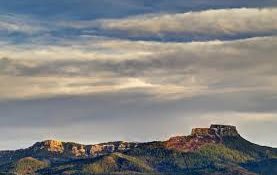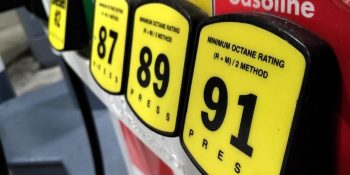Colorado pump prices to dip by at least a quarter.
DENVER (Dec. 19, 2019) – Good news, Colorado: AAA forecasts that Centennial State motorists will enjoy some of the country’s most significant savings on gas heading into the new year, with pump prices expected to plummet by as much as a quarter in the coming weeks. The reason? Increasing gasoline stocks coupled with an anticipated seasonal demand drop will together drive prices down.
Regional gasoline stocks have averaged 7 million barrels since early October, per data from the Energy Information Administration. Refinery utilization rates, meanwhile, have hovered around 85 percent or higher. Those two factors, combined with the seasonal switch-over to winter-blend gasoline – which is cheaper to produce and sell – are driving down gas prices.
“Pump prices are finally trending downward in Colorado in what has been an abnormally expensive regional gas market, of late,” said AAA Colorado spokesman Skyler McKinley. “The even better news is that 2019’s prices are down nearly a dime from 2018, thanks in large part to cheaper crude oil prices.”
On a year-to-date basis, Colorado’s 2019 statewide average for a gallon of regular unleaded is $2.57, down from $2.68 in 2018. Gas prices hit their highest point in June, at $2.87, and their lowest in February, at $2.01. Colorado has enjoyed the cheapest gas prices of any state in AAA’s Rockies analysis region – comprising Idaho, Montana, Utah, Wyoming, and Colorado.
Oil Market Dynamics
Colorado’s anticipated savings may be short-lived.
While crude oil prices have consistently fallen year-over-year, they may hover consistently above $60 per barrel as the Organization of the Petroleum Exporting Countries and its partners continue to reduce production, lowering global supply.
Earlier this month, OPEC and other major global producers, including Russia, announced an agreement to cut their total crude production by an additional 500,000 barrels per day beginning on January 1, 2020. This new agreement will likely remain in effect, without amendment, until the next OPEC meeting in Vienna, Austria on March 5.
“This reduction in global crude supply will help drain the market, which will likely otherwise be oversupplied during the first half of next year,” McKinley said. “This could lead to more expensive crude oil and gas prices in mid-to-late January as compared to the start of recent years, assuming crude demand remains robust.”
Colorado Gas By the Numbers
Durango
- Current Average: $2.57
- Yesterday Average: $2.58
- Week Ago Average: $2.57
- Month Ago Average: $2.65
- Year Ago Average: $2.54
Denver
- Current Average: $2.68
- Yesterday Average: $2.69
- Week Ago Average: $2.72
- Month Ago Average: $2.74
- Year Ago Average: $2.29
Colorado Springs
- Current Average: $2.70
- Yesterday Average: $2.70
- Week Ago Average: $2.75
- Month Ago Average: $2.75
- Year Ago Average: $2.34
Pueblo
- Current Average: $2.73
- Yesterday Average: $2.74
- Week Ago Average: $2.83
- Month Ago Average: $2.87
- Year Ago Average: $2.52
Boulder-Longmont
- Current Average: $2.73
- Yesterday Average: $2.73
- Week Ago Average: $2.76
- Month Ago Average: $2.75
- Year Ago Average: $2.30
Greeley
- Current Average: $2.74
- Yesterday Average: $2.75
- Week Ago Average: $2.78
- Month Ago Average: $2.79
- Year Ago Average: $2.37
Fort Collins-Loveland
- Current Average: $2.76
- Yesterday Average: $2.77
- Week Ago Average: $2.78
- Month Ago Average: $2.79
- Year Ago Average: $2.40
Grand Junction
- Current Average: $2.80
- Yesterday Average: $2.81
- Week Ago Average: $2.86
- Month Ago Average: $2.89
- Year Ago Average: $2.57
Glenwood Springs
- Current Average: $3.09
- Yesterday Average: $3.09
- Week Ago Average: $3.13
- Month Ago Average: $3.16
- Year Ago Average: $2.83
Vail
- Current Average: $3.19
- Yesterday Average: $3.20
- Week Ago Average: $3.24
- Month Ago Average: $3.29
- Year Ago Average: $2.84
Winter Fuel & Driving Tips
As you hit the road this winter, AAA offers these tips to help conserve fuel and keep motorists safe:
- As a precaution, keep at least half a tank of fuel in your vehicle at all times. It helps to reduce condensation in the fuel system. It also helps ensure an adequate reserve of fuel to run the engine for heat should your car become disabled in a remote location.
-
- Optimize your daily driving. Maintain steady speeds. A car uses extra fuel accelerating. Cruise control may be a fuel saving option for motorists who drive a lot because a steady speed conserves fuel. This is helpful when driving on level roads. Cruise control, however, hurts mileage if you drive on hilly terrain.
- Minimize last-minute braking. Anticipate traffic conditions. Be alert for slow-downs and red lights and coast up to them, if possible. Drive smoothly, avoiding “jackrabbit starts.” The faster you drive, the more fuel used. Remember, however, that traveling slower than traffic flow can cause a safety hazard.
-
- Don’t haul extra weight in the passenger compartment or trunk. Reducing extra weight can save up to 2% fuel economy for every 100 lbs. removed depending on the weight of the vehicle. Also lose the roof rack, if not used regularly. Carrying things on a roof rack increases aerodynamic drag and reduces fuel economy – year-round.
- Look into discounts. For example, AAA members can now save 30 cents per gallon on their first fill up, and 5 cents per gallon on every other fill-up, by signing up for the Fuel Rewards program by December 31, 2019. More information at com/Shell
- Be sure to pack an emergency roadside kit in your car containing a mobile phone and car charger, first-aid kit, blankets, drinking water and snacks, a flashlight with extra batteries, a basic toolkit, warning flares, an ice scraper, jumper cables and a shovel.
About AAA Colorado
More than 695,000 members strong, AAA Colorado is the state’s greatest advocate for the safety and security of all travelers. As North America’s largest motoring and leisure travel organization, AAA provides more than 60 million members with travel, insurance, financial, and automotive-related services — as well as member-exclusive savings. A not-for-profit organization since its founding in 1923, AAA Colorado has been recognized as the number one Colorado company its size for its advocacy, community engagement, and corporate social responsibility efforts – and is a proud member of Points of Light’s “The Civic 50 Colorado,” recognizing the 50 most community-minded companies in the state. For more information, visit AAA.com.
SPREAD THE NEWS
COMMENT, Like, Follow & SHARE @I70Scout



